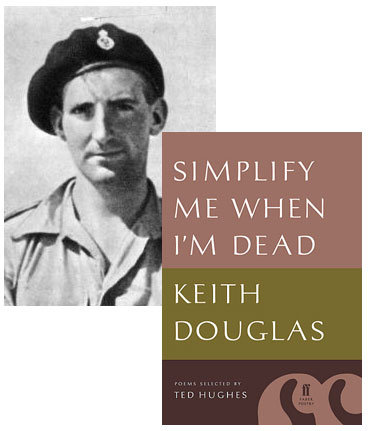Keith Douglas, “Syria”

These grasses, ancient enemies
waiting at the edge of towns
conceal a movement of live stones,
the lizards with hoded eyes
of hostile miraculous age.It is now snow on the green space
of hilltops, only towns of white
whose trees are populous with fruit
and girls whose velvet beauty is
handed down to them, gentle ornaments.Here I am a stranger clothed
in the separative glass cloak
of strangeness. The dark eyes, the bright-mouthed
smiles, glance on the glass and break
falling like fine strange insects.But from the grass, the incurable lizard,
the dart of hatred for all strangers finds
in this armour, proof only against friends,
breach after breach and like the gnat is busy
wounding the skin, leaving poison there.
People rightly remember the great British poets of the First World War, such as Wilfred Owen, but here in the States, at least, we have not heard nearly as much about Keith Douglas, who served with the Army in North Africa during the early part of the Second World War and then took part in the landing at Normandy—killed by a mortar attack three days later, at the age of 24. Simplify Me When I Am Dead, first published in 1964, is a powerful distillation (with poems selected by Ted Hughes) of his power. “Although they’re all set against the backdrop of the Second World War, they don’t deal much in politics and history, taking the enormity of their period as a given,” observed Ali Shaw. “Instead they focus on what it’s like to be alive in such times.”
Other poems include “Vergissmeinnicht (Forget-Me-Not)” and “How to Kill.” And, too, here’s an odd little film, a computer simulacrum, based on a photograph of Douglas, reading the poem that gives this collection its name:
26 May 2010 | poetry |

 Our Endless and Proper Work is my new book with Belt Publishing about starting (and sticking to) a productive writing practice.
Our Endless and Proper Work is my new book with Belt Publishing about starting (and sticking to) a productive writing practice. 
